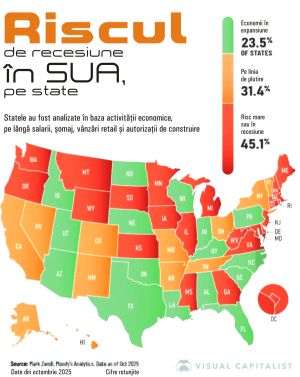The Board of Directors of the National Bank of Romania decided on Friday July 5, 2024 decrease in the monetary policy interest rate to 6.75% per annum, from 7% per annum, starting from July 8, 2024, decrease in the interest rate for the credit facility (Lombard) to 7.75%, from 8% per annum, and the interest rate on the deposit facility to 5.75% per annum, from 6% per annum.
To make this decision, the members of the Board of Directors of the BNR took into account several factors, including the inflation rate, economic growth, the growth of the Gross Domestic Product, certain financial indicators, but also the risks and uncertainties for the next period.
Regarding the annual rate of inflation, the members of the Board of Directors of the NBR found that it accelerated its decline in the first two months of the second quarter of 2024, falling to 5.12% percent in May, below the forecast level, in mainly as a result of the substantial cheapening of energy, especially of natural gas, under the influence of the legislative changes applied since April, as well as against the background of the continued decrease in the dynamics of food prices.
The press release issued by the BNR states: "The adjusted CORE2 annual inflation rate continued to decline gradually, in line with forecasts, reducing to 6.3% in May, from 7.1% in March 2024. The deceleration had as determinants also in this interval basic disinflationary effects and corrections of the quotations of agri-food commodities. (...) The annual inflation rate calculated on the basis of the harmonized index of consumer prices (IAPC - inflation indicator for EU member states) decreased to 5.8% in May 2024, (...) and the average annual rate of CPI inflation and the average annual rate of inflation calculated on the basis of the HICP decreased in May to 7.6%(...). Economic activity grew by 0.4% in the first quarter of 2024, less than expected, after contracting by 0.6% in the fourth quarter of 2023, so excess aggregate demand is likely to have continued to narrow over this period, contrary to expectations .
At the same time, compared to the same period last year, the GDP advance decreased significantly in the first quarter of 2024, to 0.1%, from 3% in the previous three months. The decrease was driven this time mainly by gross fixed capital formation, whose annual dynamics recorded a particularly wide decline from the very high double-digit level reached in the fourth quarter of 2023, while household consumption continued to accelerate its growth in annual terms".
The decision-makers at the top of the NBR claim that the evolution of net exports increased its contractionary influence in the first quarter of 2024, against the background of the slight increase in the gap between the positive variation in the volume of imports of goods and services and that of the volume of exports, which remained in negative territory, but the trade balance deficit still maintained constant annual dynamics, and the current account deficit considerably reduced it compared to the previous quarter.
The cited source mentions: "The latest data and analysis indicate a significant growth of the economy in quarterly terms in the second quarter and noticeably more solid than previously anticipated, implying a notable increase in the GDP advance compared to the similar period last year.
Thus, in the month of April 2024, the annual dynamics of retail sales and that of automobile sales recorded large jumps in relation to the averages of the first quarter of 2024, industrial production revived strongly, and the pace of the volume of construction works rose again to a double-digit level, after falling to a considerable negative value over the first three months of the year as a whole. However, the annual variation of imports of goods and services significantly increased its positive gap compared to that of exports, given its relatively more pronounced increase in April. As a result, the trade deficit sharply accelerated its growth in annual terms, and the current account deficit doubled compared to the same period of the previous year, including against the background of the deterioration of the balance of primary income and that of secondary income.
On the labor market, the number of employees in the economy resumed its monthly growth in April, at a brisk pace, and the BIM unemployment rate increased only slightly in April-May, up to 5.4%, remaining below the average level of 5, 6% recorded in the last two quarters of the previous year".
The BNR also states that the main quotations of the interbank money market extended their linear evolution in May and subsequently recorded small decreases, that the long-term yields of government securities experienced a moderate downward adjustment in the middle of the second quarter, but then rose and held to the higher levels since April, including in the context of fluctuating investor expectations about the Fed's interest rate outlook, as well as political events in Europe, likely to drive changes in international financial market sentiment and the perception of risk associated with the region. In this context, the leu/euro exchange rate remained in May June at the higher level it returned to in the second part of April.
The central bank's press release states: "The annual dynamics of credit granted to the private sector increased to 5.8% in April, after falling to 4.7% in March, and in May it remained relatively constant, at 5.7%, under the conditions in which the component in lei continued to accelerate its growth during this interval, and the rate of the one in foreign currency re-entered a slightly upward but fluctuating trajectory. Against this background, the share of the lei component in the credit granted to the private sector decreased to 68.8% in May, from 68.9% in March 2024. According to current assessments, the annual inflation rate will continue to decrease in the coming months on a trajectory significantly lower than that highlighted in the medium-term forecast of May 2024, mainly under the influence of base effects and legislative changes in the energy field, as well as against the background of the deceleration of import price growth and the gradual downward adjustment of inflationary expectations in the term short".
Regarding the increased uncertainties and risks arising from the future conduct of fiscal and revenue policy, the BNR shows that among them are the poor budget execution in the first five months of the year, the dynamics of wages in the public sector and the full impact of the new law of pensions, the non-implementation of the fiscal-budgetary measures taken for budget consolidation, although we are in the excessive deficit procedure.
The cited source also says: "The conditions on the labor market and the dynamics of wages in the economy also remain a source of significant uncertainties and risks. At the same time, significant uncertainties are associated with the impact assumed to be exerted on the prices of natural gas and electricity by the recent legislative changes, as well as the evolution of the crude oil quotation. However, the war in Ukraine and the conflict in the Middle East, as well as the economic developments in Europe, especially in Germany, continue to generate uncertainties and risks regarding the perspective of economic activity, implicitly the medium-term evolution of inflation. At the same time, the absorption of European funds, mainly those related to the Next Generation EU program, is conditional on meeting strict targets and benchmarks. However, it is essential for achieving the necessary structural reforms, including the energy transition, but also for counterbalancing, at least partially, the contractionary effects of geopolitical conflicts".
The Board of Directors of the BNR reiterates that, in the current context, the balanced mix of macroeconomic policies and the implementation of structural reforms including the use of European funds to stimulate long-term growth potential are essential for macroeconomic stability and strengthening the capacity of the Romanian economy to cope adverse developments. The next NBR CA meeting dedicated to monetary policy will take place on August 7, 2024.




























































